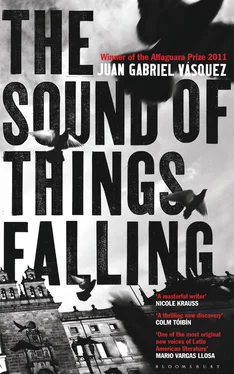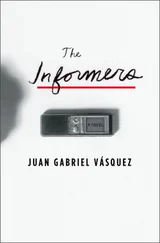‘Don’t close the door,’ I begged. ‘Let me explain.’
‘Get lost, brother,’ said the young man. ‘You’ve got no business here.’
‘I knew him,’ I said.
‘I don’t believe you,’ said Consu.
‘I was with him when he was killed,’ I said then. I lifted up my shirt and showed the woman the scar on my belly. ‘One of the bullets hit me,’ I said.
Scars can be eloquent.
For the next few hours I talked to Consu about that day, about meeting Laverde at the billiard club, about the Casa de Poesía and about what happened afterwards. I told her what Laverde had told me and that I still didn’t understand why he’d told me that. I also told her about the recording, about the distress that had swept over Laverde while he listened to it, about the speculations that crossed my mind at that moment about its possible contents, about what could be said to produce that effect on a more or less hardened adult. ‘I can’t imagine,’ I told her. ‘And I’ve tried, I swear, but I can’t figure it out. I just can’t.’ ‘You can’t, can you?’ she said. ‘No,’ I said. By this point we were in the kitchen, Consu sitting in a white plastic chair and me on a wooden stool with a broken rung, so close to the gas cylinder that we could have touched it by simply stretching out an arm. The inside of the house was just as I’d imagined it: the patio, the wooden beams visible on the ceiling, the green doors of the rented rooms. Consu listened to me and nodded, put her hands between her knees and clamped her legs together as if she didn’t want her hands to escape. After a while, she offered me a black coffee, which she made by putting the ground coffee beans into a piece of a nylon stocking and then putting the stocking into a little brass pot covered in grey dents, and when I finished it she offered me another and repeated the procedure, and each time the air became impregnated with the smell of gas and then of the burnt match. I asked Consu which was Laverde’s room, and she pursed her lips and pointed with them, moving her head like an uncomfortable colt. ‘That one there,’ she said. ‘Now it’s occupied by a musician, such a nice guy, you should see him, he plays guitar at the Camarín del Carmen.’ She fell quiet, looking at her hands, and eventually said, ‘He had a combination lock, because Ricardo didn’t like carrying keychains around with him. I had to break it when he was killed.’
The police had arrived, by chance, at the same time Ricardo Laverde usually came home, and Consu, thinking it was him, opened the door before they knocked. She found herself facing two officers, one with grey hair who lisped when he spoke and another who stayed two steps behind and didn’t say a single word. ‘You could see the grey hair was premature, who knows what that man had seen,’ said Consu. ‘They showed me an ID card and asked me if I recognized the individual, that’s how he put it, the individual, what a strange word for a dead man. And the truth is, I didn’t recognize him,’ said Consu, crossing herself. ‘The thing is he’d really changed. I had to read the card to tell them yes, the man was called Ricardo Laverde and he’d been living here since whatever month. First I thought: he’s got himself into trouble. They’re going to put him away again. I felt sorry for him, because Ricardo complied with all that stuff since he got out.’
‘What stuff?’
‘Things convicts have to do. When they get out of prison.’
‘So you knew,’ I said.
‘Of course, dear. Everybody knew.’
‘And did you know what he’d done, too?’
‘No, not that,’ said Consu. ‘Well, I never tried to find out. That would have messed up our relationship, don’t you think? What the eye doesn’t see, the heart doesn’t grieve over, that’s what I say.’
The police followed her to Laverde’s room. Using a hammer as a lever, Consu shattered the aluminium semicircle, and the lock landed in one of the little ditches in the central patio. When she opened the door she found a monk’s cell: the perfect rectangle of the mattress, the impeccable sheet, the pillow in its unwrinkled pillowcase, without the curves and avenues that a head leaves over the course of the nights. Beside the mattress, an untreated wooden board on top of two bricks; on the board a glass of water that looked cloudy. The next day that image, that of the mattress and the improvised bedside table, came out in the tabloids beside the smear of blood on the pavement of 14th Street. ‘Since that day no journalist sets foot in this house,’ said Consu. ‘Those people have no respect.’
‘Who killed him?’
‘Oh, if only I knew. I don’t know, I don’t know who killed him, when he was so nice. One of the nicest people I’ve known, I swear. Even if he might have done bad things.’
‘What things?’
‘That I don’t know,’ said Consu. ‘He must’ve done something.’
‘He must’ve done something,’ I repeated.
‘Anyway, what does it matter now,’ said Consu. ‘Or is finding out going to bring him back?’
‘Well, no,’ I said. ‘Where is he buried?’
‘Why do you want to know?’
‘I don’t know. To pay a visit. Take him flowers. What was the funeral like?’
‘Small. I organized it, of course. I was the closest thing Ricardo had to a relative.’
‘Of course,’ I said. ‘His wife had just been killed.’
‘Ah,’ Consu said. ‘You know a few things too, who would have thought.’
‘She was coming to spend Christmas with him. He’d had this absurd picture taken to give to her.’
‘Absurd? Why absurd? I thought it was sweet.’
‘It was an absurd picture.’
‘The picture with the pigeons,’ said Consu.
‘Yes,’ I said. ‘The picture with the pigeons.’ And then, ‘It must have had to do with that.’
‘What did?’
‘What he was listening to. I’ve always thought that what he was listening to had something to do with her, with his wife. I imagine maybe a recorded letter, I don’t know, a poem she liked.’
For the first time, Consu smiled. ‘You imagined that?’
‘I don’t know, something like that.’ And then, I don’t know why, I lied or exaggerated. ‘I’ve spent two and a half years thinking about that, it’s funny how a dead person can take up so much space even when we didn’t even know them. Two and a half years thinking about Elena de Laverde. Or Elena Fritts, or whatever her name was. Two and a half years,’ I said. I felt good saying it.
I don’t know what Consu saw in my face, but her expression changed, and even her way of sitting changed.
‘Tell me one thing,’ she said, ‘but tell me the truth. Did you like him?’
‘What?’
‘Were you fond of him?’
‘Yes,’ I said. ‘I was very fond of him.’
That wasn’t true either, of course. Life hadn’t given us the time for affection, and what was driving me was neither sentiment nor emotion, but the intuition we sometimes have that some events have shaped our lives more than they should or appear to have. But I’ve learned very well that these subtleties don’t cut any ice in the real world, and must often be sacrificed, tell the other person what the other person wants to hear, don’t get too honest (honesty is inefficient, it gets you nowhere). I looked at Consu and I saw a lonely woman, as lonely as I am. ‘Very much,’ I repeated. ‘I was very fond of him.’
‘OK,’ she said, standing up. ‘Wait here, I’m going to show you something.’
She disappeared for a few moments. I could follow her movements by their sounds, the shuffling of her flip-flops, the brief exchange with her tenant — ‘It’s late, papito ’; ‘Ay, Doña Consu, don’t stick your nose into what’s none of your business’ — and for a moment I thought our chat had finished and the next thing would be the boy with the sparse moustache asking me to leave with some affected phrase, I’ll see you to the door or Thank you for your visit, señor . But then I saw her coming back looking distracted, glancing at the nails of her left hand: once again the little girl I’d seen at the door to her house. In the other hand (her fingers made themselves delicate to hold it, as if it were a sick pet) she was carrying a football too small to be a football and that very soon revealed itself to be an old radio in the shape of a football. Two of the black hexagons were speakers; in the top part was a little window showing the cassette player; in the cassette player was a black cassette. A black cassette with an orange label. On the label, a single word: BASF .
Читать дальше












